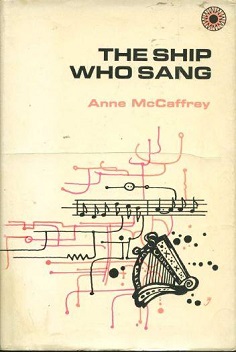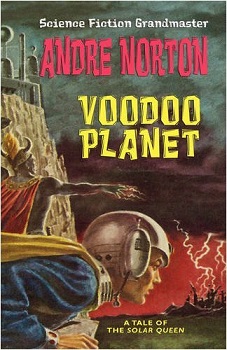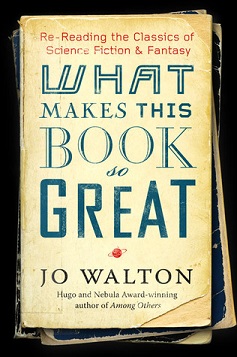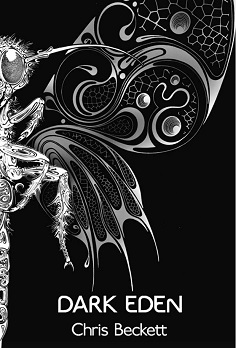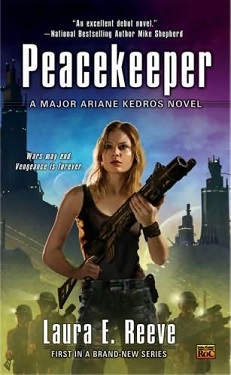
Peacekeeper
Laura E. Reeves
324 pages
published in 2008
Peacekeeper is the sort of novel you pick up knowing full well it’s probably not going to be very good, but hopefully will be entertaining. It helps, if like me, you have a bit of a weakness for military science fiction and are willing to lower your standards. Once you’ve voluntarily read David Weber’s Honor Harrington series the chances are you’ll read most anything. And, to be honest, Peacekeeper wasn’t that bad. Very much the first novel in a trilogy, but decently paced and competently written. I’m not sure I’ll go out of my way to read the sequels, but wouldn’t pass them up either If I came across them.
Ariane Kedros is the pilot of the scout ship Aether’s Touch, which she runs together with her employer Matt Journey. She’s also a reserve major int he military of the Consortium of Autonomous Worlds, which has just fought a brutal war with the Terran Expansion League, until strong hints from the Minoans — the aliens who had uplifted humanity into space and faster than light travel — put both parties at the negotiating table. Though nobody but Ariane’s superior, colonel Owen Edonus of the Directorate of intelligence, knows, in the eyes of the Terrans she’s also a war criminal, having piloted the ship that destroyed an entire solar system using temporal distortian weapons. As part of the peace treaty both sides will have to stand down and destroy said weapons and colonel Edonus has tapped Ariane to be part of the team that will escort a Terran inspection team at one of the CAW’s facilities. He of course has a hidden motive for this: somebody is killing off the people involved in the mission that made Ariane a war criminal and she’s put out as bait…
Meanwhile, once Ariane is sent on her mission, Matt gets caught up in the murder of a business partner, which seems to be related to a piece of ancient alien technology he and Ariane have found during their last explorations, something that might be similar to Minoan technology but not be of Minoan origin. Something that might make humanity no longer dependent on the Minoans so much. To get out from his troubles Matt has to apply for help from colonel Edonus, the last man he would want to help him.
Finally there’s the Terran State Prince Isrid, one of the people who has been most fanatical about getting the war criminals that had destroyed the Ura-Guinn star system. He has had to set this aside as the political reality changed and it was no longer convenient for the Terran government to use this atrocity as propaganda. He’s coming as leader of the Terran inspection team to the same facility as Ariane is on. The question for her is whether he’s the one behind the killings and what will happen once they meet; does he know she was part of the crew as well?
Much of these other subplots is setup for the next book, with the central mystery in Peacekeeper being who is killing Ariane’s old crew members and why. The obvious answer, that it’s the Terrans, is of course not the right one. That’s only to be expected, but unfortunately the revelation of the real villain came too much out of the blue for me, didn’t arise naturally from the story. In general the plotting was on the weak side, more a series of events that happen to Ariane than a solid story.
In general Ariane was too much of a victim and not enough of an active participant. She gets attacked, kidnapped, tortured, dropped off, almost kidnapped again, almost killed and never quite is in control, manipulated by friend and enemy alike. Matt meanwhile gets to do even less, mainly looking on as others rush into action, there to get the plot explained to him.
Pulling back slightly further from the plot, I wasn’t really convinced by the central moral conflict of the story, the idea that Ariane and her crew didn’t commit war crimes by blowing up an entire star system because they were following legitimate orders and that the sole reason the Terran state prince Isrid is hunting them is because he didn’t believe they were. That’s a bit much for a crime of that magnitude, even if we do learn through a flashback that Ariane and her crew had been lied to about the true nature of their mission.
Worldbuilding in general felt a bit off. At first this looks like a bogstandard milsf future, with two vaguely defined powers in conflict with each other, but there are some oddities. Many of the cultural references, religion and names we see seem to have been derived from classical Greece and there are hints that the history before humanity was contacted by the Minoans wasn’t quite our own. Certainly the future we see here, with e.g. both Christianity and Islam absent in favour of Gaia worship, with Jesus and Mohammed both reduced to minor prophets in her service, can’t quite be reached from here. The problem is that while Reeves does do a lot of proper infodumping, they don’t quite add up to explaining the setting. At first it made me wonder if, despite the lack of indicators of such, this perhaps was a sequel to an earlier novel. Having looked it up though, this is in fact Reeve’s first novel, so my guess now is that this has been a story she had been thinking about for years and she wasn’t entirely successfull in realising that what might’ve been obvious to her about it, may not be the same for her readers.
All of which adds up to a not entirely satisfactory novel; not a bad novel though for what I expected of it and something that I still enjoyed reading. It’s just that you can see the seeds of a much better novel in this.
